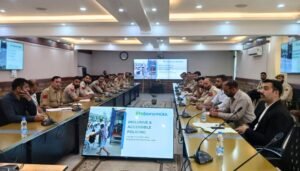
Sold by her family, Kusum’s courage is an inspiration to many. Kusum was born in a poor village in Bangladesh, and as a young girl, was sold by her brother-in-law to sex traffickers and taken to a brothel in Mumbai. At 16, after years of exploitation and abuse, Kusum was rescued by the International Justice Mission (IJM) in Mumbai in 2010. While awaiting repatriation back to Bangladesh, Kusum did not want to testify in court due to the consequences she thought she would face going through the justice system. IJM convinced her to testify and assured her of her safety, after which Kusum identified the accused and won the court’s ruling. She was sent to an aftercare shelter home where she met other girls and urged them to speak out against their assailants in court.
“Sex trafficking exists not just because a few thousand people engage in it but also because of the silent millions who tolerate it. Lawyers can use their skills to advocate for individual victims or even to advocate for changes to the way victims are handled in courts, changes in the way the system tolerates unnecessary delays.”
Michelle Mendonca
Legal Director, International Justice Mission, India
Michelle Mendonca, Legal Director of International Justice Mission said, “We’ve had many cases where victims of sex trafficking have boldly and bravely faced their oppressors in court. In Kusum’s case, the judge issued a conviction and awarded her compensation. But most importantly, because she was treated compassionately, she experienced vindication as well.”
IJM is an organisation that aims to protect people from violent oppression by rescuing and securing restoration for victims and ensuring that the justice system works for the poor. As of January 2014, IJM has assisted in the successful rescue of 496 girls and women who have been forced into prostitution in Mumbai, and has secured convictions for 70 perpetrators of commercial sexual exploitation. IJM partners with 16 aftercare shelter homes throughout India and has supported the rehabilitation of hundreds of survivors of sex trafficking.
“What motivates me to work for IJM is the thought that in the city where I live, thousands of young girls and women are being raped for profit every night. Because they are poor and considered dispensable, there is no public outcry. Very few people are willing to advocate for them”, says Michelle.
Over the last two years, iProbono has worked with IJM on eight projects, from transactional and advisory issues to advocacy and training. “I really love working with iProbono. Our specialisation is criminal law so we reach out to iProbono when we need assistance in areas where we have limited expertise. iProbono has always connected us with excellent lawyers who have been very responsive to our queries,” explains Michelle.
Debdatta Dobe, an LLM candidate from Harvard Law School, was matched to one of these projects, and assisted IJM in their litigation against sex traffickers. At that time, Debdatta was an Associate at a leading Indian law firm and worked on the project in her spare time. “I undertook research and advised on whether Indian courts would allow testimony to be given by victims remotely from their home country so as to mitigate the trauma they would experience if they had to return to India and relive their story in the courtroom. This was an incredibly rewarding project for me which I otherwise would never have known about, as my work schedule did not allow time to solicit pro bono clients”, says Debdatta.
“Having a ready database like iProbono made the task of reaching out to organisations much easier. Registering, creating a profile and connecting with organisations took no more than a few minutes and the diversity of projects on offer ensured that there was enough to keep me interested and busy. The portal is user-friendly, the clients are professional and prompt in communications and I would definitely recommend it to anyone looking for a meaningful way to use their professional skills”, she says.
Michelle too believes that the legal community can help in a multitude of ways. Many of the people who have shaped change around the world have been lawyers – and I don’t believe changing our justice system is possible without lawyers coming together and demanding change. Lawyers alone can demand and work towards restoring the broken legal system that leads to lack of deterrence for offenders.
Names changed to protect privacy












